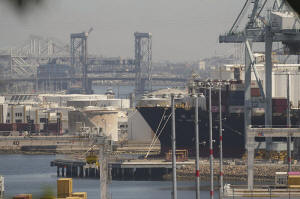Another U-Turn: Trump reverses tariffs that caused market meltdown, but
companies remain bewildered
[April 10, 2025] By
PAUL WISEMAN and CHRISTOPHER RUGABER
WASHINGTON (AP) — President Donald Trump delivered another jarring
reversal in American trade policy Wednesday, suspending for 90 days
import taxes he’d imposed barely 13 hours earlier on dozens of countries
while escalating his trade war with China. The moves triggered a
powerful stock market rally on Wall Street but left businesses,
investors and America’s trading partners bewildered about what the
president is attempting to achieve.
The U-turn came after the sweeping global tariffs Trump announced last
week set off a four-day route in global financial markets, paralyzed
businesses and raised fears the U.S. and world economies would tumble
into recession.
White House press secretary Karoline Leavitt tried to characterize the
sudden change in policy as part of a grand negotiating strategy. But to
those outside the Trump administration, it looked like a cave-in to
market pressure and to growing fears that the president’s impetuous use
of import taxes — tariffs — would cause massive collateral economic
damage.
“Other countries will welcome the 90-day stay of execution — if it lasts
— but the whiplash from constant zig-zags creates more of the
uncertainty that businesses and governments hate,” said Daniel Russel,
vice president at the Asia Society Policy Institute. “The
Administration’s blunt-force tactics have rattled allies, who see the
sudden reversal as damage control following the market meltdown, rather
than a pivot to respectful, balanced negotiations.’’
Trump’s turnaround Wednesday capped a wild week in U.S. trade policy. On
Wednesday April 2 — which Trump labeled “Liberation Day’’ — the
president announced plans to impose tariffs on almost every country on
earth, upending the world trading system. The first of his new tariffs —
a 10% “baseline’’ tax on imports from most countries — went into effect
Saturday.

At midnight Wednesday, he upped the ante by slapping what he called
“reciprocal’’ taxes on countries he accused of unfair trading practices
and adding to U.S. trade deficits. Those are the tariffs he suspended
for 90 days, saying the pause would give countries time to negotiate
with him and his trade team.
There was one exception to the reprieve: He raised the tariff on Chinese
imports to a staggering 125%, punishing Beijing for announcing
retaliatory tariffs on the United States. Meanwhile, the 10% baseline
tariffs – a substantial act of protectionism in their own right – remain
in place.
Companies cut back, delay plans
Trump’s ever-changing trade war tactics — which include earlier levies
on cars, steel and aluminum, and Mexico and Canada — have already done
damage, forcing dazed companies to delay or cancel plans as they tried
to figure out what Trump was doing and how they should respond.
Some companies temporarily laid off workers after Trump’s widespread
tariffs were announced, while there were signs that many firms held off
on hiring amid the widespread uncertainty the tariffs created.
Carmaker Stellantis temporarily cut 900 jobs at factories in Michigan
and Indiana after production was halted at two plants in Canada and
Mexico in the wake of Trump's 25% duties on imported cars.
And Cleveland-Cliffs laid off 1,200 workers at a factory in Michigan and
an iron ore mine in Minnesota in response to a drop in demand from auto
companies. Cleveland-Cliffs said it would resume production at the two
facilities once auto production returned to the U.S.
Minutes from the Federal Reserve’s March 18-19 meeting, released
Wednesday, showed that many of its policymakers said that their business
contacts “reported pausing hiring decisions because of elevated policy
uncertainty."
And Delta Air Lines said earlier Wednesday that demand for domestic
leisure trips and corporate travel has stalled because of the
uncertainty around global trade. In a conference call with investors,
the company said it was cutting capacity. It also declined to provide a
full-year financial forecast.
[to top of second column] |

The YM Uniform container ship is docked at the Port of Los Angeles
Wednesday, April 9, 2025, in Los Angeles. (AP Photo/Damian
Dovarganes)
 “Right now, it’s hard to know how
this is going to play out, given that this is somewhat
self-imposed,” Delta CEO Ed Bastian said. “I’m hopeful that sanity
will prevail and we’ll move through this period of time on the
global trade front relatively quickly.”
Desperately seeking clarity on Trump's tariffs
Businesses have sought greater clarity around Trump's ultimate
tariff policies for weeks. It's not clear that the 90-day pause has
reduced their uncertainty.
Jeff Jaisli, CEO of the New Jersey-based importer/exporter Jagro,
said Trump’s Truth Social post on Wednesday had made things “even
worse’’ and more confusing. He was trying to figure out which
tariffs applied to which countries.
“We’re scrambling to find correct information and procedures for
entries we’re processing NOW in real time,’’ he said by email. He
could find no guidance on the websites of the White House or the
Customs and Border Protection agency, which collects tariffs.
Earlier, Jaisli called Trump's tariffs "a grenade that was thrown
into the room that’s going to cause chaos.''
Trump's trade war with China escalates
Trump's tariffs have set off a tit-for-tat trade war with China, the
world's second-biggest economy. Even before Trump upped his taxes on
China to 125%, the Chinese had set their own tariffs on the United
States at 84%.
The World Trade Organization's director-general, Ngozi Okonjo-Iweala,
warned that the rising tension could reduce U.S.-China merchandise
trade by 80% and "severely damage the global economic outlook.”
“Of particular concern is the potential fragmentation of global
trade along geopolitical lines,” she wrote in a statement late
Wednesday. “A division of the global economy into two blocs could
lead to a long-term reduction in global real GDP by nearly 7%.”
Citing WTO projections, she warned the negative effects could ripple
through to other economies, especially developing ones. She urged
countries to ensure an open global trading system and resolve
differences through cooperation.
Meanwhile, U.S. companies struggled to figure out how to respond to
huge levies on Chinese products they'd come to rely on.

Jessica Bettencourt is CEO of Klem’s, a third-generation store in
Spencer, Massachusetts that sells everything from lawn and garden
items to workwear and gifts. She said that the escalation of tariffs
from China have made her stop ordering any new fourth-quarter
product that is holiday, gifts or toys. She is also reconsidering
any fall apparel and footwear orders that aren’t already placed.
“The worst thing is uncertainty and we have massive uncertainty,”
said Jason Goldberg, chief commerce strategy officer at Publicis
Groupe, a global marketing and communications company. “No one can
make any moves. Everybody is trying to save as much cash and defer
any unnecessary expense. People are getting laid off. Orders are
getting cancelled. Expansion plans are being put on hold.”
___
Robert Bumsted and Anne D'Innocenzio in New York, Dee-Ann Durbin in
Detroit and Jamey Keaten in Geneva contributed to this story.
All contents © copyright 2025 Associated Press. All rights reserved |